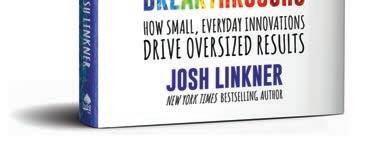
3 minute read
Break It to Fix It
BUSINESS
Josh Linkner
Advertisement
Tech entrepreneur and innovation speaker Josh Linkner believes anyone can achieve personal or career milestones by taking small creative steps. This mindset is the focus of his new book, Big Little Breakthroughs, which launched April 20 via independent publishing house Post Hill Press.
For Linkner, 50, of Franklin, who grew up in Detroit and is affiliated with Temple Shir Shalom, his fourth book speaking to creativity and innovation is a personal one. It is available in hardcover or e-book form.
“This book is special to me,” he says. “I wanted to make it for a wider audience. It’s not only for CEOs and business leaders.”
Linkner says anyone can learn from the lessons of Big Little Breakthroughs, which has been positively hailed by CEOs of tech giants and bestselling authors. The book is shaped not only by his own career as CEO of five tech companies and top-booked keynote speaker, he explains, but by the expert opinions of everyone from celebrity entrepreneurs to award-winning physicians.
“It’s about how small, everyday innovations drive oversized results,” Linkner says. “The whole notion of the book is that it’s flipping the way we think of creativity upside-down.”
He says people often think of innovation as a billion-dollar idea that changes the world. His book counteracts that, painting a picture that everyday innovators can cultivate small daily acts of creativity — “micro-innovations” — to build creative capacity.
One way is to implement a 5% “creativity upgrade.” “Building your skills can yield a very high creative result,” Linkner said. “In other words, 5% more creativity can yield 100% better business results.” Instead of believing there’s not enough time, money or material to achieve a goal, he says to challenge those beliefs by giving just 5% more, whether that’s mentally or physically.
The first half of his book, Linkner explains, makes the case for everyday creativity. He highlights the latest research in neuroscience and organizational behavior alongside stories of people who are using creativity to level the playing field. In the second half of the book, he then shares eight “obsessions” of everyday innovators that serve as principles people can apply to their own lives.
“What I discovered is that all of these amazing people that I interviewed around the world all tend to follow similar patterns,” Linkner says. Over the past two years, he spent 1,000 hours assembling research and expert opinion to include in this, his fourth book. “I share these patterns in each chapter with lots of rich stories, examples and techniques.”
Mindsets like “use every drop of toothpaste” and “fall seven times, stand up eight” serve as metaphors that readers can live by. Others, like “if it ain’t broke, don’t fix it” should be ditched, Linkner says. “They’re not the obvious cliche approaches,” he describes. “They’re really fresh and different and give people a new approach to cultivate a skill.”


Break It to Fix It
Tech entrepreneur and author reimagines creative capacity in new book.
ASHLEY ZLATOPOLSKY CONTRIBUTING WRITER
spent 1,000 hours assembling research and expert opinion to include in this, his fourth book. “I share these patterns in each chapter with lots of rich stories, examples and techpaste” and “fall seven times, stand up eight” serve as metaphors that readers can live by. describes. “They’re really fresh and different and give people a new approach to cultivate
WHY WAIT? ACT NOW
As for not fixing things unless they’re broken, Linkner advises doing the exact opposite by using the principle of “break it to fix it.”
“Why would you wait until something’s broken?” he questions. “The notion here is proactively examining what you’re doing and how you’re doing it in a deliberate way.”
Then, Linkner explains, the key is to deconstruct one’s pattern to successfully rebuild it. Linkner believes these principles among others can be used by everyone, from dentists looking to grow their practices to trial lawyers who want to be more effective in front of a jury.
“All human beings have creative abilities,” he says. “We were just born that way. It’s our natural state.”
Now, he says this way of thinking is more important than ever as patterns are broken by a new world shaped by the COVID-19 pandemic that requires people to learn different ones.
“We can no longer rely on what worked in the past and expect the same results,” says Linkner, who plans to promote his book over the next few months.
“There’s a timeliness to the book that’s also helpful. I just know it’s going to make a difference in people’s lives.”










